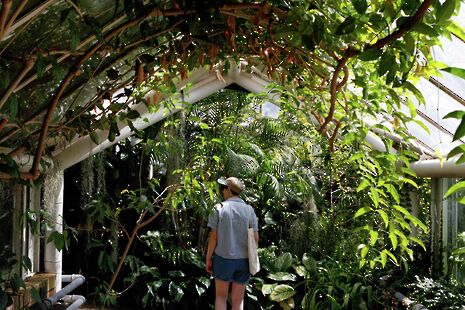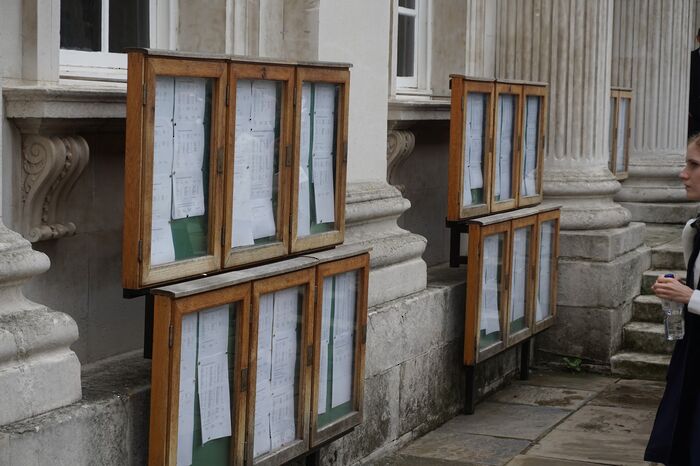Moments of peace are not moments wasted
While listening to Peace Piece, Oliver Moodie reflects on how invaluable respites are so often taken guiltily due to the pressures of Cambridge life.

(Accompanying piece: Bill Evans – Peace Piece)
Over the last year, I have found that Cambridge has an inimitable ability to make me feel guilty for not doing work. Why is that? Why won’t my brain allow me to savour the moments of downtime with friends without worrying about my essays? Why can’t I enjoy a simple brunch with college-mates for too long, for fear of the limited hours I have to finish my work? It becomes an issue when assignments that don’t even exist yet start popping into my head like a premonition of the boulder of deadlines that are to be hurled on my shoulders at the start of the new week. I feel my current mindset is a product of my environment. Improving the situation could lie not just in improving this environment, but also improving how we perceive it and our expectations of it.
Cambridge is hawkishly competitive at times. With many students admirably pursuing lofty-heights in our society, you can often feel pressured to make every millisecond in Cambridge worthy of Tolstoy’s quill. A useful analogy is that of the Red Queen Hypothesis which describes a situation in which one feels they must constantly grow and adapt just to keep up with the pace of Cambridge life. A feeling of ‘unproductivity’ develops when a few hours are dedicated to cooking in the gyp. I treated breaks as a weakness: downtime was often forced on me by friends who would notice my ‘peppery disposition’ and confiscate my laptop. I would begrudgingly ‘sacrifice’ work to catch up on Made In Chelsea or spend an evening enjoying the Footlights.
Despite institutional pressures borne, it may be more useful to be introspective about our relationship with productivity. Years of conditioning by the education system has driven us to always expect hard-work to equate future happiness. This flawed equation, coupled with quantitative evaluations at university, may drive our obsequious nature towards work. Media peer pressure is sadly an occupational hazard of our digitised society. Social media is but a blurb to the novel of one’s life and while it’s easy to verbally acknowledge the oversimplification; truly accepting that all that glitters is not gold is much more difficult, and too often we find ourselves comparing our lives to the façades presented online.
“You can often feel pressured to make every millisecond in Cambridge worthy of Tolstoy’s quill”
It was only after hearing Bill Evan’s Peace Piece for the first time one evening, and being moved to reflect on my attitude to time spent not working, that I truly learned to not just gratuitously take breaks but appreciate the simplicity of ephemeral respites that Cambridge afforded, in whatever form they take.
Peace Piece is a pastoral jazz improvisation based on a two chord ostinato (a repeated motif). The phrasing is sparse, hints at a melody fragmented and the harmonic decisions somewhat ‘colourful’ (fortunately, jazz is very forgiving in this respect) and yet somehow - it works. The undulating Cmaj7 to G9sus4 two chord progression has the uncanny effect of incompleteness throughout; even the final resolution somehow feels unfinished – and this is why it works. The piece isn’t trying to go anywhere – it’s unfettered and nomadic. Imagine, if you will, a sea voyage, but not one with a ravenous hunger for the exploratory unknown, rather a wide-eyed yearning for the immensity of the vast field of azure itself. Peace Piece sees the journey not as a means to an end, rather, an end in of itself.
As a classical musician, ordinarily, I would be searching for some deep artistic meaning in every note. But when listening to this piece, I found myself entranced by its candour – its scattered, almost unpredictable twinkling treble accompanied by a steadfast, gentle buoyant bass. Instead of considering the 6:44 minutes I sacrificed to listen to Peace Piece as wasted, I truly appreciated the piece for just being.
This piece was a major catalyst in shifting my thinking away from assuming time not being productive is misspent. Instead, I now cherish every brief corridor run-in with my flatmates or walk to lectures with friends or evening spent catching up on TV (though I do still feel somewhat guilty about Made In Chelsea). These aren’t hours wasted – these are the invaluable moments of calm, brimming with a peace of mind, that are so often overlooked in the context of prominent academic or social pressures.
So, there’s my observation on Bill Evan’s Peace Piece; a composition so unencumbered by affectation and expectation that it can feel somewhat anachronistic in our fast-paced lives. While I still maintain that time is the most precious commodity, our fleeting stock of it should not be rationed so stringently that we forget the intrinsic beauty of nature, and of friendships, and of simply being. In today’s society, where social media flamboyance has been accustomed to represent success, success itself seems incompatible with relaxation. Perhaps it’s time to consider that, for the contentment it begets, the time to relax is, incidentally, when you feel you don’t have time for it most. The intense academic nature of Cambridge is unlikely to change any time soon, but if we can change our perspective of what it means to have a fulfilling life at university as a student body – Cambridge will be all the better for it.
 News / Colleges charge different rents for the same Castle Street accommodation2 March 2026
News / Colleges charge different rents for the same Castle Street accommodation2 March 2026 News / News in Brief: waterworks, wine woes, and workplace wins 1 March 2026
News / News in Brief: waterworks, wine woes, and workplace wins 1 March 2026 News / Climate activists protest for ‘ethical careers policy’1 March 2026
News / Climate activists protest for ‘ethical careers policy’1 March 2026 News / Angela Merkel among Cambridge honorary degree nominees27 February 2026
News / Angela Merkel among Cambridge honorary degree nominees27 February 2026 News / Private school teacher who lied about Cambridge degree barred from teaching27 February 2026
News / Private school teacher who lied about Cambridge degree barred from teaching27 February 2026









